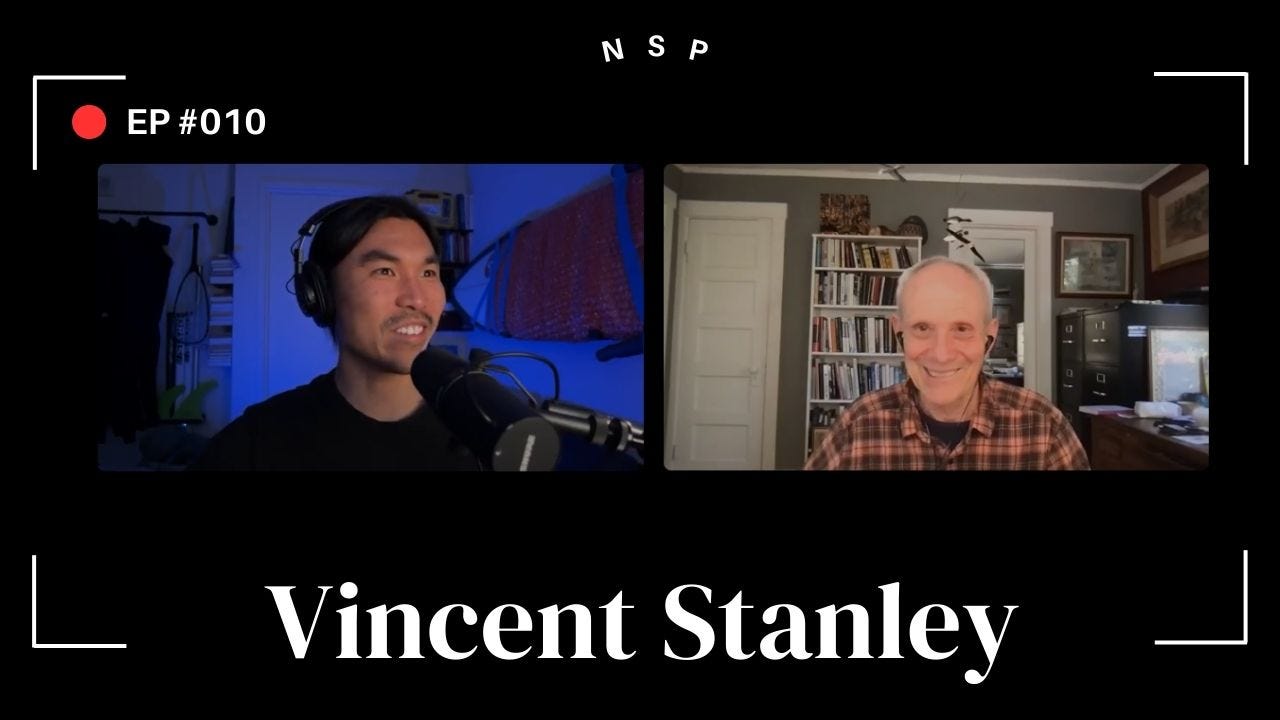Watch & Listen
🎧 Listen now on Apple
🍿 Watch it on YouTube
🎧 Listen now on Spotify
Summary
Hi friends, welcome to No Syllabus podcast faculty hours. Today's guest is Vincent Stanley, Director of Philosophy at Patagonia, where he has been for the past 50 years! (read: From the very beginning).
Part 1
In part one of our conversation, we cover:
Starting at $3 an Hour at Patagonia
Shifting Focus to Environmental Activism
Passion for Sustainability and Environmental Activism
Getting Involved in Environmental Activism
Sustainability and Responsibility in Public and Private Companies
Becoming the Director of Philosophy
Part 2
The Origins of Patagonia's Philosophy
Pivoting to the Director of Philosophy Role
Building and Maintaining Company Culture
Taking Risks for Sustainability
Mentors and Influences
Formulating the Big Picture
Stopping Too Soon and Embracing Constraints
Investment vs. Risk Fulfillment
Being Part of the Culture
Changing Views and Learning from Mistakes
Advice for Younger Generations
Hopefully, you'll find the content entertaining, insightful, and inspiring. Thank you for tuning in and let's jump right into it.
Detailed Show Notes
Vincent Stanley, Director of Philosophy at Patagonia, shares his journey from starting at $3 an hour to becoming involved in environmental activism and sustainability. He discusses the early days of building Patagonia and the company's commitment to environmental causes. Vincent also explores the challenges of operationalizing values in a company and the differences between public and private companies in pursuing sustainability. He concludes by explaining how he became the Director of Philosophy at Patagonia. Vincent Stanley, Director of Philosophy at Patagonia, shares the origins of Patagonia's philosophy and the development of their functional philosophies. He discusses his transition to the role of Director of Philosophy and the importance of teaching classes on quality and environmentalism. Vincent also explores the building and maintaining of company culture at Patagonia, emphasizing the role of consistent leadership and a strong internal culture. He highlights the importance of taking risks for sustainability and the need to view them as investments. Vincent shares insights from his mentors and the impact of their teachings on his career. He offers advice on formulating the big picture, embracing constraints, and finding fulfillment in the work you love to do. Vincent reflects on the lessons he has learned and the importance of not getting in your own way. He encourages younger generations to recognize the instability of the world and to pursue what they love without wasting time on what they don't.
Takeaways
Vincent Stanley's journey from starting at $3 an hour to becoming the Director of Philosophy at Patagonia showcases the company's commitment to environmental activism and sustainability.
Building Patagonia involved experimentation and learning from mistakes, with a focus on creating a company that aligned with the founders' values.
Operationalizing values in a company requires a commitment to responsible practices and a willingness to take risks.
Publicly traded companies face challenges in pursuing sustainability due to investor pressure, but there is a growing movement towards responsible business practices.
Chapters
00:00 Introduction and Background
00:39 Starting at $3 an Hour
08:05 Shifting Focus to Environmental Activism
14:48 Passion for Sustainability and Environmental Activism
19:30 Getting Involved in Environmental Activism
24:41 Sustainability and Responsibility in Public and Private Companies
29:32 Becoming the Director of Philosophy
31:40 The Origins of Patagonia's Philosophy
34:19 Pivoting to the Director of Philosophy Role
36:36 Building and Maintaining Company Culture
39:37 Taking Risks for Sustainability
44:28 Mentors and Influences
47:35 Formulating the Big Picture
49:55 Stopping Too Soon and Embracing Constraints
52:43 Lessons Learned and Words of Wisdom
55:18 Getting in Your Own Way
57:03 Investment vs. Risk
58:57 Fulfillment and Being Part of the Culture
59:17 Changing Views and Learning from Mistakes
01:00:37 Advice for Younger Generations












Share this post